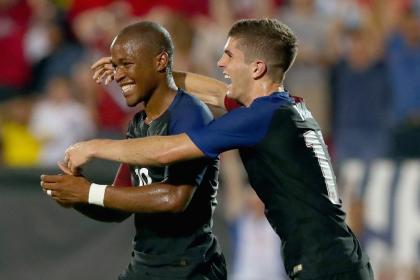The U.S.'s biggest missed opportunity in Copa America third-place game

There were several different opportunities out there for the United States men's national team in its Copa America Centenario third-place game on Saturday.
Just minutes after the Americans had been crushed 4-0 by Argentina in the semifinals on Tuesday, captain Michael Bradley questioned the entire construct of the game to sort out which losing finalist still gets a medal. "I'm not sure what sense these third-place games have," he said.
[ COPA AMERICA | Predictions | Scores/Schedule | Standings | Teams ]
There's plenty to that. They feel like nothing more than a cheap ploy for the organizers to squeeze out another game to sell tickets, merchandise, concessions and parking and give them another opportunity to sell advertising and broadcast rights. Players loathe the games. Their clubs even more so, as their stars remain away for a game that means next to nothing.
Still, there were useful upsides to Saturday's match. For starters, a win in the game that was lost in a rematch with Colombia, 1-0, would have made this the Americans' most successful Copa campaign ever. With the loss, they merely matched their run from 1995.
Or Klinsmann could have seized the game to rotate through the steady squad that has served him well in this tournament. To see who else is useful in a game that, for its lack of meaning was still a real game against a good team in a high-profile tournament.
The only changes he made were to replace the injured Fabian Johnson and John Brooks with Michael Orozco and Matt Besler, respectively. With Bobby Wood, Alejandro Bedoya and Jermaine Jones back from suspension, they were reinserted into their regular starting spots. And Tim Howard got to make a start in goal after Brad Guzan had been the first choice throughout the tournament.
But what really might have added value was to go young.

In a game that would have been an enormously beneficial experience for a developing player – in which the Americans wound up losing anyway, albeit in a much closer game than when Colombia sauntered to a 2-0 win in the tournament opener against the U.S. – Klinsmann started players who were 37, 30, 29, 30, 22, 29, 34, 28, 24, 23 and 33 years old.
He didn't insert his two best young prospects until after the 74th minute, when 17-year-old wunderkind Christian Pulisic finally came on. Eventually in the 79th Pulisic was followed by late-blooming, fellow attacking midfielder Darlington Nagbe, who is 25.
As often in this Copa America, they gave good accounts of themselves in their late cameos, suggesting that they're either ready for more or have been that for some time now.
Klinsmann, however, decided to employ this tournament not as a mid-cycle test on the way to the next World Cup, a chance to blood his younger players in a series of tough tests, but to treat it as its own major tournament. The German head coach and technical director wanted to perform as well as he possibly could. It served him well, as the semifinal run quieted the loud cabal of disillusioned fans calling for his firing.
And perhaps that wasn't his choice. It may have been a decision made over his head. Because after that first loss to Colombia, U.S. Soccer president Sunil Gulati announced that the expectation was for the Yanks to advance. The implication was plainly that if they didn't, Klinsmann's five-year spell in charge might be over in short order.
Yet even considering the above, Klinsmann made staggeringly little use of some of his younger players. Pulisic got about 88 minutes over six games. Nagbe had 49. Steve Birnbaum, the central defender who had been so impressive in early national team appearances, was given a mere 32 minutes. Yes, Yedlin (22) and Zardes (24) and Wood (23) got as much time as they could handle. But on a team still two years from the next World Cup, there were an awful lot of 30-somethings – or players pretty close to the Big Three-Oh – surrounding them.
Klinsmann has said several times that he won't rebuild or rejuvenate for its own sake. That succession at a position will be organic, occurring whenever a younger player pushes out an older one. That's a perfectly defensible standpoint to take, especially since the likes of Dempsey and Jones are still plainly better than their younger rivals.
But what happens when Nagbe finally breaks into the starting team for good in one of the final warmup friendlies before the World Cup in Russia? And he's watched most of the big games over the last few years from the sidelines? How will Pulisic develop at the international level if he isn't occasionally thrown to the wolves?
Pointing to a "growth curve" – as he does on almost any subject – Klinsmann has called for a slow integration of those players. But if that's the case, why not field them in a third-place game that's big yet also very small? What better time? Why not give the immensely promising, 21-year-old Ethan Horvath the run-out in goal and his senior debut?
Rewarding Howard for accepting a role as an understudy is all good and well. But with his vast experience, the reps do him little good since there are no significant national team games coming up until September. Horvath, on the other hand, could have gleaned a great deal.
The wisdom of Klinsmann's win-now, worry-about-later-later approach won't be measurable until Russia, of course. But if the U.S. shows up there with a team that's grown too old to compete, it may look back on matches such as Saturday's as missed opportunities to pave the road forward.
Leander Schaerlaeckens is a soccer columnist for Yahoo Sports. Follow him on Twitter @LeanderAlphabet.

 Yahoo Sports
Yahoo Sports 

